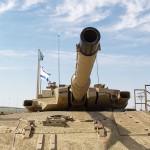 The weekend escalation in Gaza rocket-fire and subsequent Israeli airstrikes on rocket-wielding terrorists gave opportunity for Israeli officials to offer some strong words on defense. While things seem to have calmed enough for now, terror leaders should take the Israeli rhetoric to heart. The next rocket escalation may be followed by a harsher IDF response on Gaza militants.
The weekend escalation in Gaza rocket-fire and subsequent Israeli airstrikes on rocket-wielding terrorists gave opportunity for Israeli officials to offer some strong words on defense. While things seem to have calmed enough for now, terror leaders should take the Israeli rhetoric to heart. The next rocket escalation may be followed by a harsher IDF response on Gaza militants.
Traditionally, the IDF has maintained a degree of deterrence with a tit-for-tat approach: If a rocket is fired but hits an empty field, Israel typically hits empty terror targets such as tunnels or buildings. If casualties ensue from the Gaza missile attack or if a longer-range rocket is used against a bigger city, the Israeli response can increase and terrorists themselves can be targeted—as happened this weekend.
However, with the second escalation from Gaza since August and the apparent erosion of the calm achieved through Israel’s Operation Cast Lead, Israel’s leaders sound like they may be re-thinking their traditional response.
Specifically, the policy of targeted assassination of terror leaders may return.
That strategy was partly employed in Operation Cast Lead, but it made bigger headlines during the Second Intifada. Major terror figures, including one of Hamas’ founders, Sheikh Ahmed Yassin, were killed in Israeli operations. The approach is similar to the United States drone attacks in the Afghanistan and Yemen conflicts against Al Qaeda leaders.
The goal is simple: threaten the top terrorists to make them think twice before sending their underlings to attack, or else kill them to make planning attacks more difficult.
The use of this approach by Israel has generally been limited in scope in more recent counter-terror operations, except in response to major attacks. Terrorists are killed, but not necessarily the more important figures.
The latest example of an escalated target in response to a major attack was the targeted assassination of the planner behind August’s vicious Eilat terror shootings, which killed multiple Israeli civilians. Minister Benjamin Netanyahu cited that example specifically on Monday in a speech. However, he then linked his defense policy to the past weekend’s IDF operations, where the targeted terrorists were less significant.
“I have instructed the IDF and security forces to act systematically and decisively against the terrorist leaders and those who carry out the attacks,” said Netanyahu in comments to the Knesset, which were posted on the Prime Minister’s Office website.
“That is what we did with the terrorist group from the Sinai a couple of months ago. The person who initiated and organized the attack was eliminated several hours later. That is also how we acted this weekend.”
To be more clear, here’s how Israeli Vice Premier Silvan Shalom was quoted by Israel Radio on Tuesday, according to The Jerusalem Post: “If the rocket fire does not stop, Israel will act directly against the terrorist infrastructure and the heads of terrorist organizations.”
While Shalom didn’t outright say, “targeted assassinations,” that’s one of the most likely implications. Alternatively, he may have been referring to another operation in Gaza—or he could be referring to both.
The assassination of top terrorists is a middle-ground Israel can take to intensify their response and heighten their deterrence, while at the same time reserving the more serious option of invading Gaza for later. At the same time, it could also be part of a broader effort to end the rocket fire.
Another reason why the targeted assassination strategy might be renewed is the freeing of kidnapped soldier Gilad Shalit. His life could have been endangered in the event of a major assassination—whether by the terrorists as a response, or if he was being hidden in the building or tunnel being bombed by Israel in an effort to kill the terror leader. With Shalit safely home, that no longer is a concern.
How soon could this tactic be applied? It quite possibly could be during the next rocket escalation. So far, it seems to have calmed down significantly for the time being, so the IDF is unlikely to risk another barrage on Israeli civilians by escalating things now.
Despite that, Gaza terror leaders should beware: Israel is already thinking about how to make the rockets stop more permanently. The next rocket launch the terrorist leaders order could be their last.
(By Joshua Spurlock, www.themideastupdate.com, November 2, 2011)
